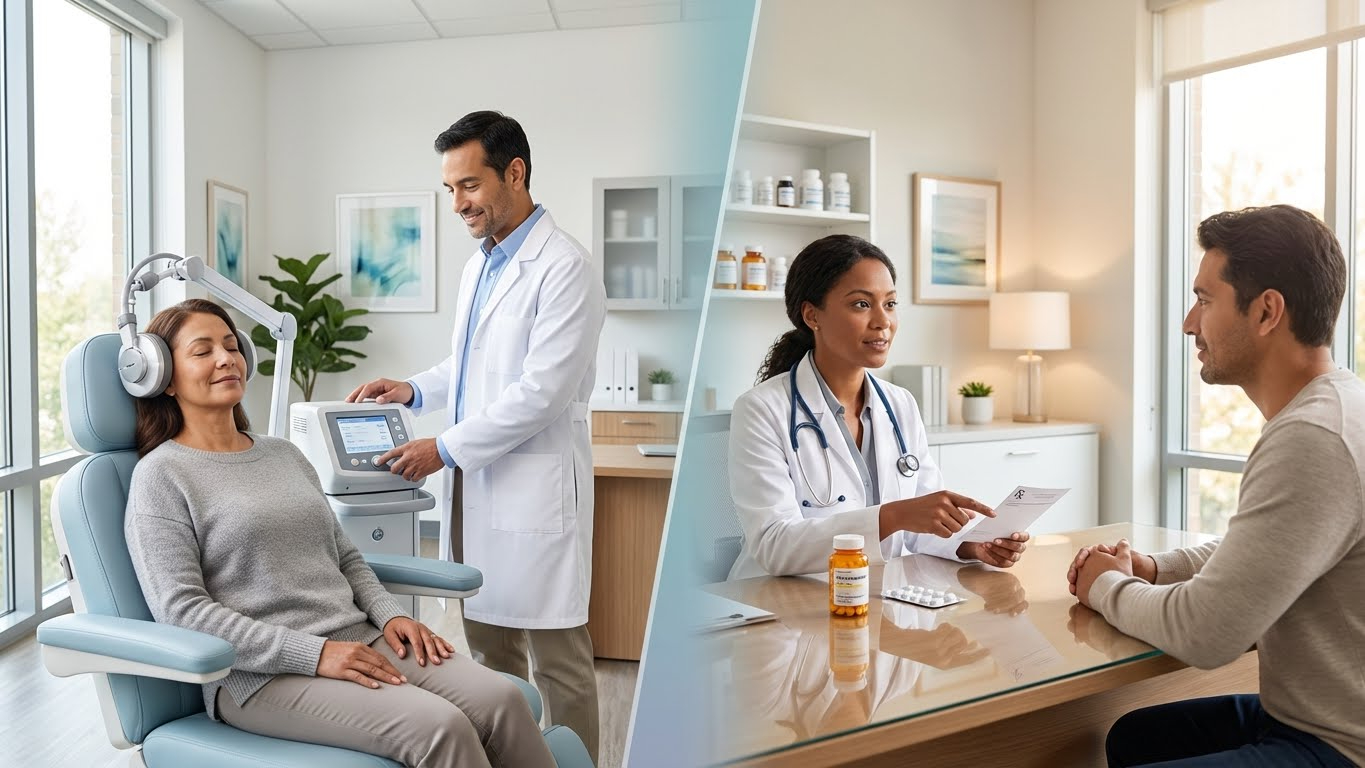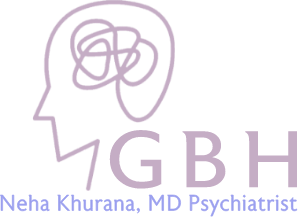
- June 4, 2025
TMS Therapy vs. Traditional Medication Therapy: Which One Is Right for You?
Feeling exhausted in your mental health journey? You’re not alone. Traditional psychotherapy has been around for decades, but a new non-invasive approach to depression treatment called transcranial magnetic stimulation has been offering hope for those who have not found a solution in traditional medication therapy. Transcranial magnetic stimulation, or TMS Therapy, is a modern-day innovative treatment for depression that offers new possibilities.
As per the reports of the World Health Organization, over 280 million people suffer from depression globally. Many individuals suffer from treatment-resistant depression. In this aspect, traditional counseling has been well-documented. Over 30% of patients with depression do not respond as required to psychotherapy vs. the TMS approach. The TMS approach has been a game changer, providing practical and immediate results.
What is traditional medication therapy?
Many people start their mental health journey with medications that a psychiatrist prescribes. These prescribed drugs help your brain utilize mood-related chemicals more efficiently. Over time, with increased use, these drugs help lift your spirits, restore energy, and improve your sleep cycle. There are high chances of side effects from these drugs, and it usually takes weeks to show positive results.
- How it works- SNRIs and SSRIs maintain noradrenaline levels and adjust serotonin. Doctors start with low doses, gradually increasing until the patient feels relieved. Regular checkups help monitor mood and any side effects caused.
- Common medications – A range of drugs are mainly used to manage the effects of depression. Fluoxetine and Sertraline are used for SSRIs. Venlafaxine and Duloxetine are used effectively for SNRIs. At the same time, Bupropion and Mirtazapine are used for atypical depression.
These are widely available and, in most cases, are covered by insurance. However, it may take 4-6 weeks to show progress, and they also come with side effects, such as insomnia and a weight change. Over the years, traditional medicine has remained the first choice for many, but there is a high chance that it might not be for everyone.
One Conversation Can Change Everything! Consult Dr. Neha Khurana for
What is TMS therapy?
When the burden of pills and their side effects becomes too heavy, TMS therapy offers a drug-free alternative that can bring significant relief. Georgia Behavioral Health uses TMS-safe magnetic pulses to activate the underperforming brain areas linked to mood. Its direct approach can spark movement more quickly than medications, offering a ray of hope in your mental health journey.
- How it works: A magnetic coil on the scalp sends painless pulses. Sessions last 20 to 40 minutes, five days a week, and the whole course spans 4-6 weeks and covers 30-36 sessions.
- Benefits: There will be no organized side effects on the body, like sexual dysfunction or weight gain. Many of the patients have noted relief within 2-4 weeks.
- Drawbacks: It requires daily or alternate-day clinic visits. Each session costs approximately $400 to $500, for a total of $6000 to $12000, making it expensive. There is a chance that some patients might not be able to afford it. It can lead to scalp soreness or mild headaches.
The TMS therapy is FDA-approved for treatment-resistant depression. If you are someone for whom medications are not working, this non-invasive treatment can be a breakthrough.
Comparing TMS therapy and Traditional medication
Understanding the in-depth applications of the two can help you choose the right option for you. Each method has its timeline, results, working methods, and advantages and disadvantages. By comparing each one in detail, you can choose which suits you.
| Feature | TMS therapy | Traditional medication therapy |
| Mechanisms | TMS therapy targets certain brain regions with magnetic pulses. | Medication changes the chemicals in the brain. |
| Speed of improvement | TMS can help you feel better in 2-4 weeks. | It takes 4-6 weeks to show the effectiveness. |
| Side effects | It includes side effects related to scalp discomfort and sometimes mild headaches. | Medications can lead to sleep issues, nausea, and weight changes. |
| Commitment | It needs daily clinic visits for over a month. | Medication requires periodic clinic visits and daily pills. |
| Cost | TMS has higher in-session costs. But if insured, it would be helpful. | Medication is usually low out-of-pocket if insured. |
There is no universal solution to mental health treatment. Before selecting the proper treatment, consider your side-effect tolerance, treatment history, and daily schedule. Discuss these factors with your healthcare provider to decide whether TMS or traditional medication therapy suits you. Georgia Behavioral Health can guide you through decision-making, considering your unique circumstances and preferences.
Who can be an ideal candidate?
At Georgia Behavioral Health, we understand that each person’s mental health journey is unique. We analyze your symptoms, history, and preferences to help you choose the right treatment option. Whether you are a new patient seeking treatment or have tried different approaches, we have a specific path for you, ensuring you feel understood and cared for.
- Ideal for traditional medication patients having mild-to-moderate anxiety or depression. First-time treatment seekers can select medication therapy; those who are comfortable with daily pill routines can explore a different treatment option or continue with their pill routine.
- Ideal for TMS patients experiencing side effects of medications, diagnosis of treatment-resistant depression, and patients who can attend daily clinic visits.
- Overlap candidates who want a combined approach for sustainable and faster relief. Individuals who are open to talk sessions and neurostimulation.
One Conversation Can Change Everything! Consult Dr. Neha Khurana for
Myths and misconceptions
The treatment of depression is surrounded by misconceptions and myths that can divert people from seeking help. At Georgia Behavioral Health, we focus on clearing such myths so you can choose confidently.
Here are some myths or misconceptions about the treatments. We aim to debunk these myths and provide you with accurate information to help you make an informed decision about your mental health treatment.
- Pills will change my personality- antidepressant pills have the objective of restoring balance, not changing who you are as a person.
- TMS causes brain damage – Although the pulses of TMS are well-tolerated and based on decades of research, there is no evidence of lasting harm. You can rest assured that TMS therapy is a safe and effective treatment for depression, providing you with a sense of security and confidence.
- Once I start, I will need treatment forever – many of the patients find relief and can gradually decrease pill routines under professional guidance. The maintenance plans vary based on individual requirements.
- TMS ruined my life- there is no concrete evidence that TMS has shown adverse effects over time. However, financial burdens can tamper with mental health, requiring TMS treatment for a long time or vice versa.
Separating myths and misconceptions with facts would empower you to pursue the best care for yourself. Always rely on expert judgments, not misconceptions.
Integrative care at Georgia Behavioral Health
We focus on utilizing every possible tool to help you heal. Blending treatments can provide the best outcomes. Some of our patients start TMS while on medication, and others add lifestyle coaching and talk therapy to achieve stringent results. GBH offers the following care services.
- TMS & Medication- fine-tuning chemistry in the brain while directly targeting mood circuits.
- Wellness coaching- We offer comprehensive exercise, nutrition, sleep management, and stress management support for a positive recovery.
- Psychotherapy- DBT or CBT can help you build lasting coping skills.
We at Georgia Behavioral Health craft a plan for your life and goals. For a personalized approach, you can mix and match both approaches for a sustainable result.
FAQ
Q. How does TMS therapy differ from traditional medication therapy?
Ans: Traditional medication therapy relies on daily pills such as SNRIs and SSRIs, which help maintain balanced neurotransmitters in the brain. TMS, a non-drug approach, directly directs certain brain regions through magnetic pulses.
Q. Can I continue antidepressants while receiving TMS at Georgia Behavioral Health?
Ans: Yes, many of our patients at Georgia Behavioral Health integrate medications with TMS under close supervision to maximize the benefits.
Q. Is TMS a painful procedure?
Ans: TMS is a painless and non-invasive procedure in which a coil is placed against your scalp to deliver magnetic pulses to massage the brain’s salience network, which regulates emotions and mood.
Q. Can TMS therapy only be used for severe depression?
Ans: While TMS therapy has displayed remarkable results in treatment-resistant depression, it is also effective in other conditions such as obsessive-compulsive disorder, anxiety disorder, and post-traumatic stress disorder.
Q. How do I get started with treatment at Georgia Behavioral Health?
Ans: You can call our specialists or visit our website to schedule an appointment. Based on your medical history, we will perform an assessment and recommend a personalized treatment plan. This process applies to all treatments at Georgia Behavioral Health.
